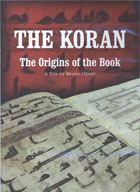
The Koran: Back to the Origins of the Book 2010
Distributed by Icarus Films, 32 Court St., 21st Floor, Brooklyn, NY 11201; 800-876-1710
Produced by ARTE France, 13 Production
Directed by Bruno Ulmer
DVD, color, 52 min., in English, French or German (with subtitles or voiceover)
Sr. High - General Adult
Religious Studies, Middle Eastern Studies, History, Anthropology
Date Entered: 01/07/2011
Reviewed by Maureen Puffer-Rothenberg, Valdosta State University, Valdosta, GABruno Ulmer’s The Koran tells the story of the sacred Scriptures of Islam and looks at archeological investigations of the most ancient existing Koranic manuscripts. The film briefly explains the content and organization of the Koran (Qur’an), and traces its history from its revelation to the prophet Mohammed through its role in uniting early Islamic empires spread throughout the Middle East, to the present-day devotion and practice of believers.
French scholar François Déroche explains that in its original form the Arabic text lacked consonants or punctuation; it was meant to support an oral tradition of recitation from memory. Footage from schools, museums and historic mosques show today’s Muslims gathering to worship and study, and to visit ancient Koranic manuscripts enshrined as objects of devotion.
Farid Heider, an Imam and also a language student at the Free University of Berlin, is interviewed, representing the believer’s reverence for the Koran. Cameras follow Heider as he is allowed to see and read from one of six extant Korans many Muslims believe was written nearly 1,400 years ago under the direction of the caliph Uthman, an important associate of Mohammed. Farid’s reverence is palpable and moving as he marvels at the book—a huge tome of 1,087 leaves, at least a foot thick and weighing more than 176 pounds.
The Koran examines efforts to balance Muslim traditions with scientific examination of old manuscripts. Because Muslims believe the Koran has remained unchanged for fourteen centuries through the agency of God, studies of the earliest known texts can create tension between scientists and believers. Tolou Khademalsharieh, a Muslim and Corpus Coranicum project assistant, interviews about working with parchment fragments of Korans from 680 B.C., which were discovered in a Yemeni mosque in 1972. The fragments show rewrites and erasures and appear to differ from the current Koran. In a conversation with Khademalsharieh, Heider affirms that his faith can withstand this scientific scrutiny.
The Koran is beautifully filmed, featuring dramatic and colorful images of manuscripts, paintings, and historic mosques, as well as people of all ages reading the Koran in daily study and worship. The historical background is made more engaging through lovely animations of ancient portraits and maps in flickering jewel tones.
Viewers may watch the film in its entirety or select from six chapters: Origins of the Koran; The Period of Revelation; Uthman’s Koran; The Koran in the Umayyad Period; The Might of Islam; and The Photograph Collection of Gotthelf Bergsträsser. Three additional interviews are included as bonus features, with Déroche, Heider, and Corpus Coranicum Research Director Angelika Neuwirth.
This fine and accessible introduction is appropriate for adult and young adult (high school) audiences. It is a good choice for general collections as well as those specifically supporting religious studies, as current events highlight tensions between Christian and Islamic worldviews.